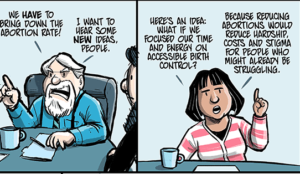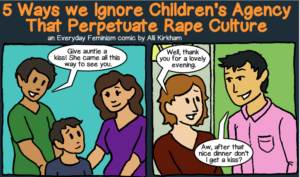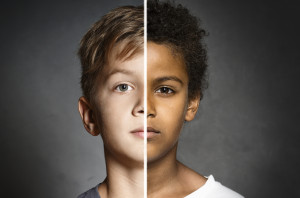
A family sits at a table, praying over Thanksgiving dinner together.
Originally published on The Humanist and republished here with permission.
In the wake of the 2016 election results, pundits and analysts trying to understand Trump voters continue to center the pain and desires of white America – because power doesn’t like to be threatened.
The White House will soon be occupied by a narcissistic and irresponsible man who we’ve been asked to respect because of the “democratic process,” despite the deep betrayal his campaign represents to people who are Black, Muslim, Latinx, LGBTQIA+, immigrants, refugees, women, disabled, and other marginalized communities.
Even worse, some writers suggest “giving him a chance” – despite the fact that we already know he has the support of white supremacists; we have recordings of his objectification of women and countless sexual assault charges; we know his views on climate change and on the truth; and we have, over the course of a very public life, witnessed exactly how erratic and puerile his behavior can be.
Even if these arguments are meant to generate feelings of conciliation and appease a polarized American public, now is not the time for that.
Giving Trump a chance suggests that his election is not a deeply disconcerting event that reveals the dysfunctional culture brought to a boiling point with his win.
As a divided nation, many of us who didn’t want to see Trump rise to power are dealing with our heartbreak, grief, and fear through rumination. We are trying to profile those who voted for Trump. We have hypothesized on our own and been exposed to think pieces hypothesizing even more reasons why people voted for Trump.
We’re reeling over this election. And we’ve made the following assumptions about Trump voters: No matter their stated policy-based reasoning for backing him, Trump voters must be – at the very least – okay with sexism, racism, xenophobia, treating LGBTQIA+ people like second-class citizens, and with putting profits before indigenous lives or any other lives of color.
Outwardly endorsing or even condoning a leader who embodies this bigotry is surely the same as being bigoted in all of these ways, magnitude of bigotry notwithstanding.
Yet these voters might be loved ones, relatives, friends, and former friends. They might be invited (or disinvited) to your Thanksgiving holiday gathering. And there are 60.8 million of them.
Looking ahead to future elections, all people of conscience in a position to ought to engage these voters in conversation and try to change their hearts and minds.
And for those who believe such efforts are futile, this action is not for you to take. For those who are hurt and angry by the outcome of the election, fearful of its implications, or exhausted by injustice against your communities – this action is not for you to take.
I admit that I really don’t feel like engaging with people who, through their vote, have demonstrated utter apathy for my having an equal opportunity to thrive in this country, who disregarded the humanity of so many of their fellow Americans, and who have little inclination for discovering truth.
However, those who are in a better emotional and mental position to engage with Trumpism can attempt to remedy if not these voters’ past beliefs and actions, their current beliefs and future behaviors.
In a 1962 letter to his nephew, James Baldwin wrote of white Americans and their conflicted relationship with Black people and race:
“[White Americans] are in effect still trapped in a history which they do not understand and until they understand it, they cannot be released from it. They have had to believe for many years, and for innumerable reasons, that black men are inferior to white men.”
Many of them indeed know better, but as you will discover, people find it very difficult to act on what they know. To act is to be committed, and to be committed is to be in danger. In this case, the danger in the minds and hearts of most white Americans is the loss of their identity.
This election is emblematic of a culture so deeply divided by who can see and is prepared to respond to injustice within our social institutions.
For many white Americans, reaching this awareness does uproot and completely demolish their sense of identity and pride in their cultural heritage.
The triumph of Trump is just one manifestation of the deeply-rooted psychological illness that is the attempt to live up to the American dream, which places personal responsibility above all and fails to understand the systemic and institutionalized forms of oppression that allow some to rise at the expense of others and prevent many from getting ahead.
This cognitive dissonance makes for an unhappy society and translates into discriminatory practices and attitudes towards marginalized communities. Unfortunately, it also makes it very difficult to open minds to change.
There is more than one way of transforming social norms. Each approach, informed by or fitting because of our life experiences with leverage and views gained from our social positions and identities, have valid roles on the path to progress.
If you’re in a role or emotional headspace where you can speak to a loved one about how their views discount the lived realities of so many other communities and get them to care about that injustice, do it!
This is not a call for forgiveness. Nor is it a call for acceptance or resignation.
Stay indignant about the centering of white pain and frustrations over the suffering of many others caused by the myths America builds itself upon. But feed that energy into educating others, if only for the simple reason that revolution requires numbers, transformation requires bodies, and that human beings, no matter their beliefs, have inherent dignity.
It also has been demonstrated to work if you believe in engagement for change as an approach worth pursuing. For example, by this Black musician who dialogues with KKK members, whose efforts have resulted in thirteen de-robings, and this rabbi who confronted anti-Semitism from a KKK leader with love and compassion.
But how can you hold these conversations?
There is a thorough, decentralized, and crowdsourced document circulating on social media on “How to Talk to Your Loved Ones About a Donald Trump Presidency” that I first encountered via the Showing Up for Racial Justice (SURJ) Facebook page.
Here are some tips sourced from American Humanist Association staffers, the guide above, and other resources on dialoguing with people of opposing views:
- Start from a place of genuine curiosity without contempt. Employ the Socratic method to reveal the step-by-step rationale for supporting Trump: What changes are you looking forward to from a Trump presidency? Which of his views do you support?
- Inquire about and ask the other person to verbalize the ways different populations are negatively affected if Trump enacts policies he discussed on the campaign trail. Freely use appeals to emotion as a stepping stone to broadening their spheres of empathy: Which of his views do you not support? What would happen if he enacted this policy? What if this policy affected your significant other/livelihood/stature?
- Employ Daniel Dennett’s four-step guide for criticizing views with kindness as synthesized in Brain Pickings:
- You should attempt to re-express your conversation partner’s position so clearly, vividly, and fairly that they say, “Thanks, I wish I’d thought of putting it that way.”
- You should list any points of agreement (especially if they are not matters of general or widespread agreement).
- You should mention anything you have learned from your conversation partner.
- Only then are you permitted to say so much as a word of rebuttal or criticism.
- Frame your explanation of the consequences of a Trump administration with the tangible outcomes on the lives of people instead of through partisan language, references to policy, or social justice terminology. For example, strategist Keith Tubbs suggests that instead of saying “they will repeal Obamacare,” liberals and progressives should frame the idea as “they will strip healthcare from over twenty million people.”
There are many ways to contribute to social progress, and we each have our roles. Let’s remember that transformation of society requires liberation of those who do not see its ills – which always reminds me of this morsel of wisdom from Paolo Freire, as written in The Pedagogy of the Oppressed:
“Consciously or unconsciously, the act of rebellion by the oppressed (an act which is always, or nearly always, as violent as the initial violence of the oppressors) can initiate love. Whereas the violence of the oppressors prevents the oppressed from being fully human, the response of the latter to this violence is grounded in the desire to pursue the right to be human. As the oppressors dehumanize others and violate their rights, they themselves also become dehumanized. As the oppressed, fighting to be human, take away the oppressors’ power to dominate and suppress, they restore to the oppressors the humanity they had lost in the exercise of oppression.”
[do_widget id=’text-101′]
Jessica Xiao is a Contributing Writer for Everyday Feminism. She is a self-proclaimed nerd and book hoarder who is guilty of tsundoku. Often inaccurately described as Canadian, she thinks of herself more as a Montrealer with US citizenship living in Washington, DC, after having obtained her BA & Sc. in Psychology and the dark art of Economics at McGill University. She is a grant writer for the Montreal-based international women’s economic development nonprofit Artistri Sud and the former assistant editor and writer at The Humanist. She believes in empathic action and bringing our whole selves to every aspect of our lives for transformational social change. She frequently quotes Dorothy Parker and writes bad poetry at stillsolvingforx.tumblr.com
Search our 3000+ articles!
Read our articles about:
Our online racial justice training
Used by hundreds of universities, non-profits, and businesses.
Click to learn more




















